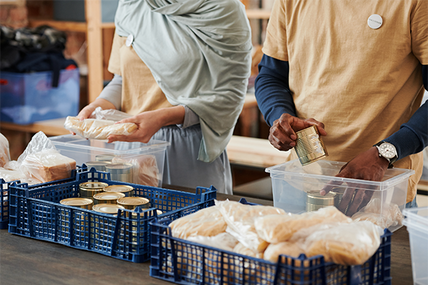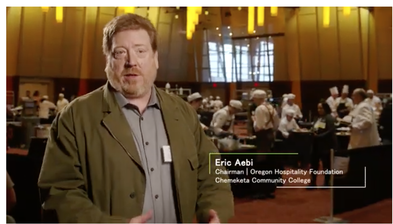 Approximately 20% of all employment along the Oregon coast is in leisure and hospitality jobs, making this one of the largest employer groups in the region. This also makes the hospitality industry one of the most important economic drivers along the coast. The Oregon Restaurant & Lodging Association (ORLA) and the Oregon Hospitality Foundation are working with three workforce development boards covering the coast to create a Hospitality Industry Sector Partnership in order to support the industry’s workforce development needs. The proposed partnership aims to strengthen the industry by supporting businesses in understanding how to create an environment in which they become known as a great place to work with competitive pay and benefits, and simultaneously educating the public about the career opportunities available within the industry. Read more about this effort in the project narrative that outlines the statement of need and projected outcomes. In tandem to this effort, ORLA's President & CEO Jason Brandt will be joining the Statewide CTE Advisory Board, advocating for improved access to market-driven occupations in our school systems across the state. If you want to learn more about this or if you are interested in becoming more involved, reach out to Jason Brandt. ORLA keeps members informed and educated with the latest information, industry intelligence and research via several channels. In addition to the blog, members receive more comprehensive insights via the monthly Insider e-newsletter and access to the Member Portal with data and research.
Not a member yet? Visit our Membership page or reach out the ORLA Regional Representative nearest you.  Guest Blog | Food Waste Stops with Me As a food service business, you have the power to create a positive impact in your community by donating your excess edible food to local food banks and pantries. Not only does this provide much-needed nourishment to your hungry neighbors, but it also comes with many benefits for your business. In this blog post, we'll explore the advantages of donating your surplus food and how you can establish a program with the help of local government staff. Support from Local Government Setting up a food donation program is a straightforward process, especially when you have the support of local government staff. They can provide technical assistance with donation dos and don’ts, best practices for success and connect you with food banks and pantries in your area, ensuring that your excess edible food reaches those who need it most. By working together, you engage employees to create a strong network of support that uplifts your neighborhood and builds meaningful connections. Liability Protection and Tax Incentives Potential liability issues are among the leading concerns for businesses considering donating their food. Federal and state laws protect you from liability when you donate food in good faith that you believe to be safe and edible (Bill Emerson Food Donation Act and Oregon Good Samaritan Law). Additionally, your business may be eligible for tax incentives provided by the federal government, further reducing any financial burden and encouraging participation in food rescue programs. Prevent Waste, Benefit the Environment The hospitality industry generates a significant amount of food waste. By taking proactive measures to prevent avoidable waste by donating your excess abundance, you contribute to a healthier environment. Not only can this act of kindness save you money on disposal fees, but it also promotes goodwill for your business. Embracing sustainable practices like sharing extra food and ensuring it is not unnecessarily wasted showcases your commitment to making a difference in your region. Enhancing Your Reputation and Community Engagement Not only is donating food a responsible and compassionate choice, but it also boosts your business's reputation. When your customers see your dedication to giving back, they view your establishment as one that cares about its most vulnerable community members. This supportive act can increase customer loyalty, improve employee satisfaction and influence others in your industry to follow your lead. Launch your food donation program today- it’s easy and rewarding! Visit FoodWasteStopsWithMe.org to learn more or to request assistance from a local food waste reduction specialist. SHARE YOUR STORY! Does your business have a successful donation program going? Share your experience to inspire other companies to follow in your footsteps! Click here and submit your Success Story- we can’t wait to hear from you! Food Waste Stops with Me is a collaboration between Metro, the Oregon Restaurant & Lodging Association, the Oregon Department of Environmental Quality, and city and county governments to help food service businesses reduce food waste. This guest blog was submitted by Food Waste Stops with Me. For more information on guest blog opportunities, contact Marla McColly, Business Development Director, Oregon Restaurant & Lodging Association.
Oregon’s Healthy Unemployment Insurance Trust Fund Makes Businesses and Communities Stronger7/19/2023
Oregon has one of the best unemployment insurance (UI) tax systems in the nation. While there are federal requirements all states must follow with their UI trust funds, there is room for state flexibility, and Oregon has taken advantage of this to minimize employer tax rate volatility, protect employers from additional charges, and provide a strong safety net for recessionary times. During strong economic times, the tax schedule increases so we can replenish Oregon’s UI Trust Fund. Once we have strong reserves, the tax schedule drops so employers have lower taxes. Each employer’s individual tax rate is based on the amount of UI benefits their employees receive. Also, Oregon’s UI Trust Fund’s reserves earn interest. Over the last 10 years, UI Trust Fund interest added $797 million. That means about 20 percent of the increase in the UI Trust Fund balance in the past 10 years came from interest earned — not employer payroll taxes. Due to Oregon’s self-balancing system, the more interest earned, the more likely we are to have a lower tax schedule. One way to look at it is, with Oregon’s UI tax system, employers only had to pay 80 cents on the dollar for the benefits paid out. During the Great Recession and the COVID-19 pandemic, many states had to borrow money because their UI Trust Funds were not solvent — employers in those states pay more than $1 for each dollar of benefits paid to workers. Benefits don’t just help laid-off workers. They also support communities and businesses by ensuring that money keeps flowing through the local economy during economic downturns. During the recent Pandemic Recession, Oregon’s UI Trust Fund paid out $859 million in regular UI benefits from April to June 2020 — twice as high as any calendar quarter during the Great Recession. Also, researchers have estimated that every $1 of UI benefits generates about $2 in economic activity in that community. During a recession, this can be a vital support for our economy. Thanks to Oregon's healthy UI Trust Fund, we did not have to borrow any money during the Pandemic Recession, unlike many other states. Those states also faced borrowing costs, restricted options on policy, and higher federal payroll taxes and surcharges for employers. While employers in other states saw additional UI taxes and other costs, Oregon has been a careful steward of employers’ tax dollars. With 2021’s House Bill 3389, lawmakers protected employers from increased payroll taxes that might have resulted from the unprecedented number of Oregonians who received UI benefits during the Pandemic Recession and allowed employers to defer or avoid some tax liability. In addition to short-term tax relief, HB 3389 extended the look-back period for the fund adequacy percentage ratio from 10 years to 20 years and omitted calendar years 2020 and 2021 from the formula. These changes mean:
This editorial wss provided by the Oregon Employment Department. ORLA had a very tangible return on investment proving how advocacy and relationship building efforts can drive bottom line results for businesses when House Bill 3389 passed in the 2021 legislative session. This important bill provided assistance to Oregon employers with both short- and long-term provisions, offering significant relief to employers. Read more about how ORLA's Advocacy Drives Bottom Line Results.
 Building Future Hospitality Leaders / Portland Summit / Whiskey Event / Heat Webinar ProStart Promotional Video – ORLA and the Oregon Hospitality Foundation have a new promotional video for our ProStart program. We have important work ahead in supporting high school teachers who provide culinary arts and management training for high school students around the state. Our annual ProStart Championships and ProStart curriculum built for each school year provide great opportunities for students and educators to connect with industry operators. You can check out the video here which we’ll use to promote the program in the coming years. Portland Hotel & Restaurant Safety Summit – ORLA in partnership with Downtown Portland Clean & Safe and the City of Portland is pleased to invite our Portland area hotels and restaurants to a “Hotel & Restaurant Safety Summit” Thursday, July 27th from 10 am to noon at The Nines Hotel, 525 SW Morrison Street, Portland, OR, 97204. The goal is to provide our hospitality industry with an overview of current and future public safety plans and strategies from the Portland Police Bureau, the City of Portland, and various private security partners and organizations. Safety for industry staff, patrons, and locations is an ongoing concern and this event will provide networking connections, security-related resources and information to strengthen many existing private-public safety and livability partnerships. To learn more and to RSVP please reach out to Makenzie Marineau on the ORLA staff who oversees Portland government affairs issues for the association. Whiskey Event Coming to Portland August 26 – ORLA's Swig & Savor, which offers whisk(e)y lovers an opportunity to try a curated list of beverages from distillers around the world, is back for its second year. The annual event will be Saturday, August 26 from 5:30 to 9:30 p.m. at the Portland Marriott Downtown Waterfront in Portland, Oregon. Tickets are now available starting at $149 per person. The highlight of Swig & Savor is the opportunity to sample whisk(e)ys from top producers in the Northwest and beyond. This includes seven distilleries in Oregon and companies from nine other states and three countries. Distilleries will bring current releases as well as special bottles available only to VIPs. You can purchase tickets today at www.swigandsavor.com. Webinar on OR-OSHA Heat Rules – Over the past few months the Northwest Grocery Association team has been working with OR-OSHA and the Governor’s office in an attempt to get clarity about the ‘bakery’ exemption in the Oregon Heat Rules. As you may recall, this ‘exemption’ was meant to exclude temperatures generated from equipment (bakeries, manufacturing, commercial kitchens) from the Heat Rules (new training, mandatory breaks, water, shade etc). However, recent practices and positions by OR-OSHA have now essentially made this exemption moot. The rules took effect last June 15, 2022 and kick in when outside air temperatures reach 80 degrees. In an effort to provide employers greater information and training, OR-OSHA has agreed to staff a webinar on the Heat Rules specific to “Hot Process.” They have also updated the FAQ and Fact Sheet. All employers are welcome to join this webinar, especially HR and Facilities Teams; get the link here. ORLA keeps members informed and educated with the latest information, industry intelligence and research via several channels. In addition to the blog, members receive more comprehensive insights via the monthly Insider e-newsletter and access to the Member Portal with data and research.
Not a member yet? Visit our Membership page or reach out the ORLA Regional Representative nearest you. |
Categories
All
Archives
June 2024
|
Membership |
Resources |
Affiliate Partners |
Copyright 2024 Oregon Restaurant & Lodging Association. All Rights Reserved.
8565 SW Salish Lane Suite 120 | Wilsonville, OR 97070-9633 | 503.682.4422 | 800.462.0619 | Contact Us
Site Map | Accessibility | Privacy Policy
8565 SW Salish Lane Suite 120 | Wilsonville, OR 97070-9633 | 503.682.4422 | 800.462.0619 | Contact Us
Site Map | Accessibility | Privacy Policy

 RSS Feed
RSS Feed


